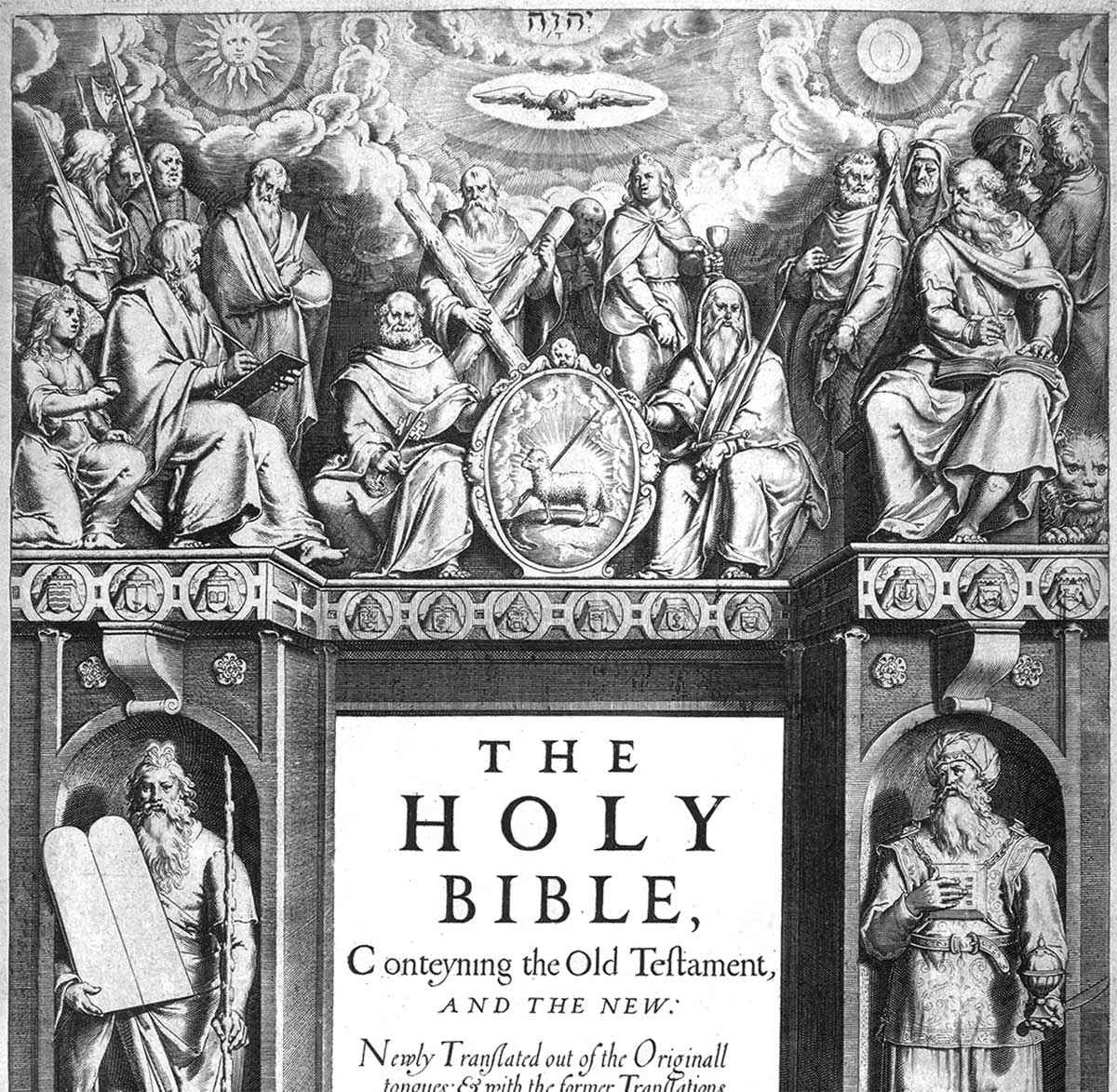Features
God’s English
The Making & Endurance of the King James Bible, 1611–2011
The King James Version of the Bible (KJV) is fast becoming one of the great unread books of Western civilization—remembered and admired but not used. True, there is still a small band of believers in the fundamentalist tradition whose loyalty to the KJV remains uncompromised. But the vast majority of Christians in the English-speaking world think of the King James Bible as a hindrance rather than a help: an interesting document but, in the twenty-first century, pointlessly difficult to understand; an artifact prized by one’s grandparents because it reminded them of another time.
It’s the sad but inevitable end to the greatest of all biblical translations—sad because the translators’ goal was to make the Scriptures more, not less, accessible: a goal they achieved on a worldwide scale. Miles Smith’s preface to the first edition explains that goal beautifully.
Translation it is that openeth the window, to let in the light; that breaketh the shell, that we may eat the kernel; that putteth aside the curtain, that we may look into the most Holy place; that removeth the cover of the well, that we may come by the water, even as Jacob rolled away the stone from the mouth of the well, by which means the flocks of Laban were watered. Indeed without translation into the vulgar tongue, the unlearned are but like children at Jacob’s well (which was deep) without a bucket or something to draw with; or as that person mentioned by Isaiah, to whom when a sealed book was delivered, with this motion, Read this, I pray thee, he was fain to make this answer, I cannot, for it is sealed.
For well over three centuries in Britain and North America, the King James Bible was the Bible. Its language permeates our literature. In twenty-first-century Britain, where biblical illiteracy is almost total, phrases from the King James Bible still echo across the cultural landscape—a fact attributable to the nation’s Christian past, but also to the biblical translation that defined that past.
Even so, the Authorized Version, as it used to be called, is now thought of chiefly as an historical novelty. Young people raised in Christian homes today are hardly aware of its existence. Accessible translations, some of them very good, proliferate. You can hardly blame a modern congregation, one with no historical or emotional ties to the King James Version, for avoiding it—all the thee’s and thou’s and begat’s and whithersoever’s can sound bizarre to younger Christians. Yet somehow it seems tragic that a young Christian in an English-speaking country should enter adulthood with no experience of the KJV’s language.
As the King James Bible turns 400, it’s worth reflecting on what we’ve lost.
James & Geneva
It is impossible to appreciate the triumph of scholarship that was the King James Bible without first appreciating its provenance. In 1603, when James VI of Scotland ascended the English throne upon the death of Elizabeth I, the idea that the Scriptures ought to be translated at all was still a recent one. As late as 1513, John Colet, Dean of St. Paul’s, had been suspended from his preaching duties for having translated the Lord’s Prayer into English. But by the end of the sixteenth century, there were several English Bibles in circulation, legal and illegal. The problem was that the idea of biblical translation was still new enough to be a deadly serious one, and none of the available translations appealed across theological lines.
So for Britain’s political and ecclesiastical leaders, the question was no longer whether the nation would have an English translation of the Bible, but which one it would have. And in 1603 there was no obvious answer. The Bible then given royal sanction, the Bishops’ Bible of 1568, was a mostly competent but uneven translation (now remembered chiefly, though unfairly, for its rendering of Ecclesiastes 11:1—instead of “Cast thy bread upon the waters,” it read, “Lay thy bread upon wet faces”). The most accurate translation was the Geneva Bible, a superb work of scholarship produced by a group of English exiles in Geneva during the reign of Mary Tudor (whose death in 1558 had made Elizabeth I Queen).
The Geneva was also the most popular Bible, vastly outselling all competitors; indeed, the Bishops’ Bible had been an unsuccessful attempt (by Archbishop Matthew Parker and other bishops) to undercut the Geneva’s appeal. The trouble with the Geneva Bible, however, was that James—together with his ideological allies in the Church of England—hated it.
The Geneva relied on many of Tyndale’s translations; the word presbyteros was translated “elder” instead of “priest,” for instance, and the word ekklesia became “congregation” instead of “church”—renderings certain to offend James’s steadfastly hierarchical views of church government. There were other offenses; whereas the Bishops’ Bible avoided the word “tyrant” altogether, the Geneva Bible seemed to go out of its way to use it—the word appears more than 400 times in the Geneva translation.
But what James and his allies hated most about the Geneva Bible was its energetically Calvinist textual notes, particularly those relating to governmental and monarchical authority. At 2 Chronicles 15:15–17, for example, where Asa, King of Judah, deposes his idolatrous mother, Maacah, Geneva’s notes credit the king for some of his reforms but rebuke him sharply for failing to have Maacah executed.
Or again, at Exodus 1:19, where the midwives invent a convincing but flatly untrue explanation for why they haven’t killed the Hebrew women’s newborn sons, the Geneva notes lightly censure the midwives for deception but credit them for disobeying orders. The idea that disobedience to a monarch could be anything but damnable was deeply offensive to the new king of England.
The Hampton Court Conference
One of the great ironies about the King James Bible is that it wasn’t the outcome of godly intentions. The decision to commission a new translation of the Bible was, in fact, part of a cynical political maneuver on the part of the monarch and his allies.
In 1603, England was a nation just beginning to taste the benefits of political stability. War had ceased (for a time) to be a constant threat, and Elizabeth had managed to avoid or elide many of the ecclesiastical disputes brought about by the Reformation. Consensus was in the air.
But the Puritans, for their part, weren’t interested in consensus; they were interested in change. They had high hopes for James. He had been tutored in Scotland by the great Reformed humanist George Buchanan, and was well trained in the ways and doctrines of Scottish Presbyterianism. Puritans—or in any case the more “moderate,” non-separatist Puritans—felt that, with the accession of James, their moment had come. At last the Church of England could begin the reforms that so many continental churches had already achieved.
As James traveled south from Scotland in October of 1603, he was presented with the so-called Millenary Petition, a list of grievances supposedly signed by 1,000 Puritan ministers. So James, wishing to be perceived as the bringer of unity, did what politicians often do in difficult circumstances—he called for a conference. Puritan clergy would meet with him at Hampton Court the following January.
The results of that meeting were deeply disappointing to the Puritans. The king, by that time heavily influenced by Richard Bancroft, Bishop of London—a cynical man and a vicious persecutor of separatists—used the Hampton Court Conference to display his considerable wit at the Puritan party’s expense. James denied almost every one of their proposals—even those he might have granted at very little cost, such as modest alterations to the Book of Common Prayer.
Just one major request was granted to the Puritans. One of their party requested that “one only translation” be declared “authentical and read in the church.” The motive behind this request isn’t altogether clear. It may have been an attempt to get James to agree either to make the Geneva Bible the official translation or, since that was unlikely, at least to allow the Geneva translation to be read in church. James was sufficiently learned to see that the Bishops’ Bible was not satisfactory, and he agreed that indeed there should be one official translation—he decreed that work should begin on a new one.
It soon became clear, though, that James had no intention of giving the Puritans what they wanted. When Archbishop John Whitgift died soon after the Hampton Court Conference, the king made Bancroft, the old anti-Puritan, Archbishop of Canterbury, and Bancroft, in consultation with James, drew up the rules of translation and chose the translators. There would be no Geneva-like commentary in the new Bible. The translators themselves were drawn largely from the anti-Puritan circles of Oxford, Cambridge, and the Anglican hierarchy. The bishops were granted power to revise, the Privy Council power to censor, and the king, through Bancroft, exercised final authority over every word.
The Puritans had asked for bread. James gave them a stone. Or so it must have seemed to them at the time.
The Translators’ Skills
Yet however unlovely the circumstances of its provenance, as a translation, the King James Bible was a first-rate work of scholarship. There were six “companies” or committees of translators, each with seven to ten members: the First Westminster Company (Genesis to Second Kings), the First Cambridge Company (First Chronicles to Song of Songs), the First Oxford Company (Isaiah to Malachi), the Second Oxford Company (Gospels, Acts, Revelation), the Second Westminster Company (New Testament Letters), and the Second Cambridge Company (Apocrypha).
Very little is known about most of the translators. There is Andrewes, head of the First Westminster, and Hadrian à Saravia, an ambitious churchman and gifted scholar. And there is John Rainolds, spokesman for the Puritan party at Hampton Court and a member of the First Oxford. But the vast majority of these men are remembered exclusively, if at all, as James’s translators. Even less is known about the process of translation. Almost the only evidence we have of the translators’ working habits comes from a brief comment by a man who wasn’t himself a translator.
What is clear is that these men’s labors came together to form a work of brilliance. The praise showered on the King James Bible for more than 200 years can sometimes sound a trifle formulaic (“probably the most beautiful piece of writing in all the literature of the world”—H. L. Mencken), and one suspects much of the praise accorded to the KJV properly belongs, not to it, but to the books of which it is a translation. Even so, the king’s translators deserve much of the credit for the KJV’s durability.
First, they understood, far better than modern translators have, the importance of rhythm in language. This is partly because learned men of the seventeenth century were steeped in written languages—English and Latin, but also Greek, Hebrew, French, Italian, and Spanish—to a degree that even the best educated cannot match now. They understood the dynamics of poetry: Andrewes was himself a brilliant poet, but the others, too, would have been deeply familiar with ancient and modern meters.
Equally important is the fact that the King James translators knew that their renderings would be heard even more than they would be read. The great preponderance of parishioners in early seventeenth-century England were partly or wholly illiterate, and for that reason the translators were careful to make their sentences easy to read aloud. Time and again the KJV’s language falls into a snappy iambic cadence that rolls off the tongue.
Rhythm & Reverence
There are exceptions, of course, and more modern versions often exhibit a sonorous rhythm. The 1978 New International Version’s (NIV) translation of Jeremiah 31, for example, could hardly be bettered. But while it’s probably unfair to pit a specific passage in the KJV against its counterpart in another translation, a brief comparison between the first two verses of Psalm 12 in the King James Bible and the same verses in the 2010 Updated NIV will illustrate what I mean.
1 Help, Lord; for the godly man ceaseth; for the faithful fail from among the children of men.
2 They speak vanity every one with his neighbour: with flattering lips and with a double heart do they speak.1 Help, Lord, for no one is faithful anymore; those who are loyal have vanished from the human race.
2 Everyone lies to their neighbor; they flatter with their lips but harbor deception in their hearts.
The twelfth Psalm is not one of the more famous, and the KJV displays no particular brilliance in its translation. Rather, it performs the straightforward task of turning the Hebrew text into rhythmical, readable English—“for the faithful fail from among the children of men.” The Updated NIV, by contrast, with the exception of the correctly translated “vanished,” reads like rather dull prose: instead of the shorter substantival adjective (“the faithful” in the KJV), it opts for the wordier “those who are loyal,” a phrase no English speaker would use in conversation, and certainly not in a poem.
In the first phrase of verse 2 the KJV arranges the English words in a way that makes them easy to read aloud (“every one with his neighbor”) whereas the Updated NIV, presumably to avoid using a masculine singular pronoun for the word “everyone,” lapses into ungrammatical nonsense (if “everyone” is plural, “they” should also have more than one “neighbor”). And in the second phrase of verse 2 the KJV translates the Hebrew literally but, again, gives the words a readable cadence—“with flattering lips and with a double heart do they speak”—while the Updated NIV, uncomfortable with the Hebrew “double heart,” again opts for the nonsensical: “harbor deception in their hearts.” But the “deception” of which the Psalmist speaks is not “harbored” in men’s hearts, as in self-deception or a mere temptation to deceive, but is spoken through their lips.
The King James translators were not inspired, and their translation only scales the heights of eloquence where the original Hebrew and Greek do. They simply had a keener feel for the way English sentences work.
Indeed, too much is made of the KJV’s “poetic” language. “Again and again,” writes Adam Nicolson in God’s Secretaries (2003), the translators “chose a word not for its clarified straightforwardness . . . but for its richness, its suggestiveness, its harmonic resonances,” giving the KJV’s readers the feeling that its words “are somehow extraordinarily freighted, with a richness which few other texts have ever equalled.” The KJV’s words do frequently possess a certain “richness” and “suggestiveness,” but that is because its translators labored to make their English translation reflect the richness and suggestiveness of the original.
And it is that commitment to and reverence for the biblical text, coupled with the translators’ facility for shaping English phrases, that gave their Bible its universally acknowledged superiority.
Matters of Interpretation
Translation, to one degree or another, is interpretation. Every translator comes to understand that, in many cases, he isn’t just translating his author, he’s interpreting him. The relationship between the parts of the original text and those of the language into which it is being translated is an inexact and oblique one.
There are many words, phrases, and idioms in ancient Hebrew and Greek for which there is no obvious equivalent in English, and in each case the translator must choose whether to reflect this uncertainty in the translated text or to decide what the original writer meant to say. And there are some instances, particularly when translating ancient texts, in which the translator simply must interpret; otherwise the text is indecipherable. But many translations of the second half of the twentieth century have made a policy of interpreting rather than translating.
The King James translators, for their part, understood the temptation to interpret rather than translate, and avoided it as well as they could. Royal decree notwithstanding, their work was not guaranteed success. For their biblical translation to achieve any level of esteem, it had to be an accurate one; anything else would have been ridiculed as propaganda or second-rate scholarship by separatist Puritans and Roman Catholics alike.
It is the chief virtue of the King James Bible that its translators adhered to the original texts even at the expense of allowing ambiguities and enigmas to pass into the English translation. Their priority lay in allowing the Bible to speak for itself, in all its strangeness and mystery. Again Miles Smith’s Preface:
It hath pleased God in his Divine Providence here and there to scatter words and sentences of that difficulty and doubtfulness, not in doctrinal points that concern salvation (for in such it hath been vouched that the Scriptures are plain), but in matters of less moment, that fearfulness would better beseem us than confidence, and if we will resolve, to resolve upon modesty with S. Augustine . . . Melius est dubitare de occultis, quam litigare de incertis: It is better to make doubt of those things which are secret, than to strive about those things that are uncertain.
Just one example. The Old Testament at several points speaks of God “repenting” from a previously chosen course of action. Hence Jonah 3:10: “And God saw their [the Ninevites’] works, that they turned from their evil way; and God repented of the evil, that he had said that he would do unto them; and he did it not.” That word “repented” is a direct translation of the Hebrew word naham, which, when applied to a person’s deeds or intentions, implies a sharp and emotionally heightened change of mind, or regret.
In those passages in which God is said to exercise this kind of about-face, modern translations—with the exception of the American Standard Version (ASV) of 1901 and intermittently the Revised Standard Version (RSV) of 1952—have substituted the word “relent” for “repent.” There is, of course, a reasonable justification for that decision: God does not “repent” from moral wrongdoing as man does.
The King James translators would have been just as keenly aware of that problem as modern translators have been, yet they chose a direct translation and let readers work out the theological difficulty for themselves. And there’s an excellent reason for that decision, too. The word “relent” doesn’t convey the emotional intensity of a sharp reversal implied by naham—and indeed, it’s reasonable to assume the biblical writers themselves weren’t unaware of the difficulty implicit in the notion of God abandoning his intention in a moment of sorrow and compassion.
Faults & Flaws
The point here isn’t that the King James translators always made the right decision; rather, it’s that they cared less about perspicuity than accuracy. And that legacy of reverence for the biblical text has inspired all that’s best in twentieth-century translations, particularly the ASV and the New ASV (1963), the RSV, and, more recently, the English Standard Version (2001). Compared to the King James Bible, these translations are, on balance, more prone to infelicities of language, but they are serious works of translation and fall squarely in the King James tradition.
Although the King James Bible is an excellent and reliable translation, however, it’s far from a perfect one. Indeed, the KJV’s New Testament contains a number of faulty readings, based as it almost exclusively is on a family of manuscript texts known as the Textus Receptus. The earliest of these manuscripts dates from about the tenth century, whereas scholarship has since produced manuscripts dating from as early as the fourth.
The most notorious problem with the KJV’s text has to do with the so-called Comma Johanneum, a corrupt version of 1 John 5:7–8, in which an explicit enumeration of the Trinity was interpolated into John’s text and allowed to stay there by men who should have known better.
There are a substantial number of other, lesser problems with the KJV’s New Testament text. The last clause of the Lord’s Prayer (“for thine is the kingdom, and the power, and the glory, forever”) was almost certainly not part of Matthew’s text, and the words “bless them that curse you, do good to them that hate you” in Matthew 5:44 have also likely been interpolated. Then there are the mistakes and oddities inevitable in a translation as old as this one. At Hebrews 10:23, for example, the word should be “hope,” elpidos, rather than “faith”; and “Drink ye all of it” makes it sound as if Jesus was telling his disciples to drain their cups, whereas he was telling “all” of them to drink it.
To concentrate on its translational problems, however, is to miss the point of what we are losing as the Authorized Version of the Bible slips into the realm of historical memory. What we’re losing is a religious language; indeed, the very idea of a religious language.
A Religious Language
One of the principal reasons the King James Bible has achieved such astonishing durability is that its diction captures the gravity and splendor one feels God’s words deserve. The Scriptures are old, and the feeling that they should sound old is a natural and proper one. Partly, of course, the KJV sounds old because it is old. But there’s more to it than that. The King James Bible was never what we would call a “modern” translation; even in 1611 it sounded antiquated. The ancient feel of its language was, in fact, largely deliberate.
This was in some measure the consequence of an assumption shared with biblical translators throughout the preceding century: they assumed that the structure of God’s sentences should be given the greatest possible deference. The great sixteenth- and seventeenth-century translations endeavored wherever possible to preserve the basic sentence structure—the word order—of the original text, even when doing so produced slightly peculiar formulations.
Here’s one example, drawn almost at random: Matthew 13:24 begins with these words: “Another parable put he forth unto them.” An English speaker would be far more likely to say, “He put forth another parable unto them.” But the KJV, following Tyndale, Geneva, and the Bishops’ Bible, aligns its words as closely as possible to the Greek text. And it’s that policy—call it translating “literally”—that gives the KJV its foreign, vaguely unworldly texture.
On a few occasions, however, the KJV inverts the natural English word order deliberately, and by that means gives important phrases a suitable lilt. Again one example will suffice, this one from 1 Chronicles 21:13: “And David said unto Gad, I am in a great strait: let me fall now into the hand of the Lord; for very great are his mercies.” Every modern translation, and every sixteenth-century one except the Bishops’ Bible, translates that last phrase in the commoner way: “his mercies are very great.” The King James translator, whoever he was, must have felt the Bishops’ inversion (“passing great are his mercies”) did more justice to David’s distressed eloquence.
Then there are the archaisms. In Psalm 90:10, to take one well-known instance, Moses says, in the King James, “The days of our years are threescore years and ten; and if by reason of strength they be fourscore years, yet is their strength labour and sorrow.” The KJV follows the Geneva and the Bishops’ Bible in rendering the Hebrew numbers, literally translated “seventy” and “eighty,” with the graver and slightly antiquated “threescore years and ten” and “fourscore,” giving Moses’ observation an air of timelessness and grandeur. The ASV and RSV are about the only modern translations to retain that convention; all others opt for “seventy” and “eighty” and consequently sound flat and prosaic by comparison.
Wherefore Thee’s & Thou’s?
But by far the most important way in which the King James Bible sacralizes its English (if that’s not too highfalutin a way to put it) is by retaining archaic pronouns and verb endings—thou knowest, etc. It’s true that prior translations had used these forms, but by the early seventeenth century most of them were not in common use, particularly in more urban environs. The King James translators may have retained them in order to give their renderings a sacred or ancient texture, or simply to maintain continuity with older translations.
Whatever the reasons, the King James Bible’s ascendancy over the course of the following centuries established forever the connection between these older word forms and scriptural subjects. So much so, indeed, that it soon became conventional to use the older forms in prayer and public worship. Given the absence of any distinction between a formal and informal second-person pronoun in English, the convention made sense. Now, of course, it’s all but dead. The RSV, the ASV and the New ASV retained the archaic forms in passages that address God directly, but the “updated” forms of these translations have dropped even that compromise convention.
One can hardly blame modern translators for abandoning the thee’s and thou’s. They are alien to us, accustomed as we are to informality. Still, there was something noble and beautiful in the way English developed a kind of sacred para-language. Alister McGrath, in his otherwise excellent book on the King James Bible, In the Beginning (2001), sounds uncharacteristically impatient with those of an older generation who insist on the propriety of the archaic pronouns. “Some have suggested,” he writes, “that the King James Bible’s use of ‘Thee,’ ‘Thou,’ and ‘Thy’ to refer specifically to God is a title of respect, and argued that modern Christianity should retain this practice.” This he says is “indefensible,” since these pronouns were used of everybody, not just God.
That is true only in the narrowest historical sense. It ignores a centuries-long tradition of Christian prayer and hymnody, as well as many of the language’s greatest poems, sacred and otherwise. Cowper and Watts and Wesley did not use archaic pronouns and verb forms because that sort of language was the norm in the eighteenth century; they did so, rather, because it was commonly thought that poems intended for the worship of God deserved a higher diction. Shelley wrote, “Hail to thee, blithe spirit!/ bird thou never wert,” not because he thought it would make his meaning more readily understood, but because he thought the subject of his poem, a skylark, merited an elevated or “spiritual” form of address.
A Lesson
It is not possible to retain the older forms. A clergyman today would be ill-advised to try using thee and thou in a congregation accustomed to you and your, as nearly all congregations have become. But we can learn at least this from the King James Bible’s signal longevity: that there was once a difference between sacred language and other kinds of language, and the difference was neither artificial nor oppressive.
Barton Swaim works as a speechwriter and is the author of Scottish Men of Letters and the New Public Sphere (Bucknell, 2009). He is a member of First Presbyterian Church in Columbia, South Carolina, a church of the Associate Reformed Synod.
subscription options
Order
Print/Online Subscription

Get six issues (one year) of Touchstone PLUS full online access including pdf downloads for only $39.95. That's only $3.34 per month!
Order
Online Only
Subscription

Get a one-year full-access subscription to the Touchstone online archives for only $19.95. That's only $1.66 per month!
bulk subscriptions
Order Touchstone subscriptions in bulk and save $10 per sub! Each subscription includes 6 issues of Touchstone plus full online access to touchstonemag.com—including archives, videos, and pdf downloads of recent issues for only $29.95 each! Great for churches or study groups.
Transactions will be processed on a secure server.
more on bible from the online archives
more from the online archives
calling all readers
Please Donate
"There are magazines worth reading but few worth saving . . . Touchstone is just such a magazine."
—Alice von Hildebrand
"Here we do not concede one square millimeter of territory to falsehood, folly, contemporary sentimentality, or fashion. We speak the truth, and let God be our judge. . . . Touchstone is the one committedly Christian conservative journal."
—Anthony Esolen, Touchstone senior editor












